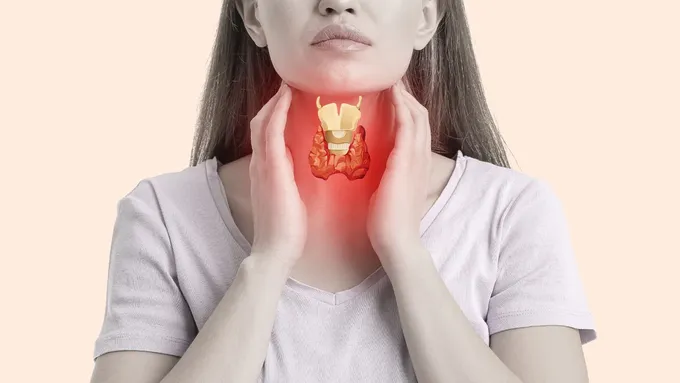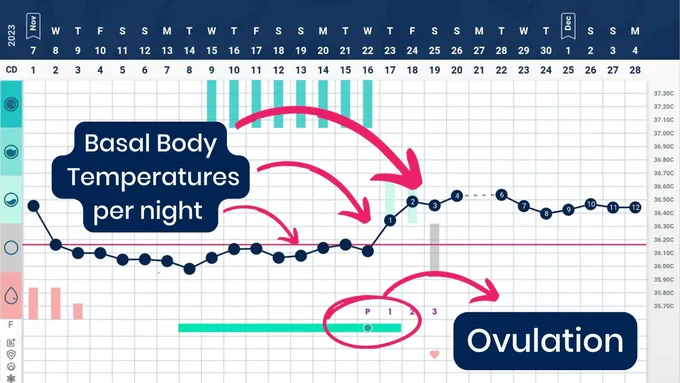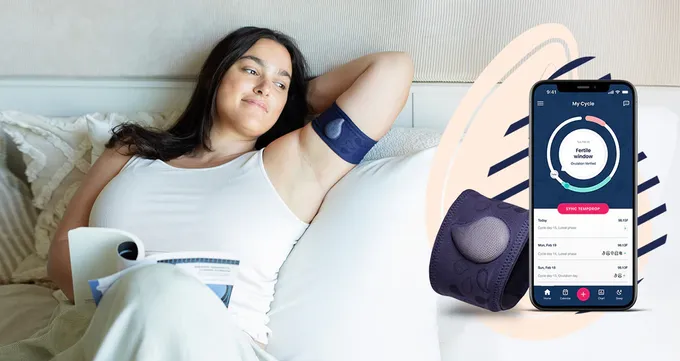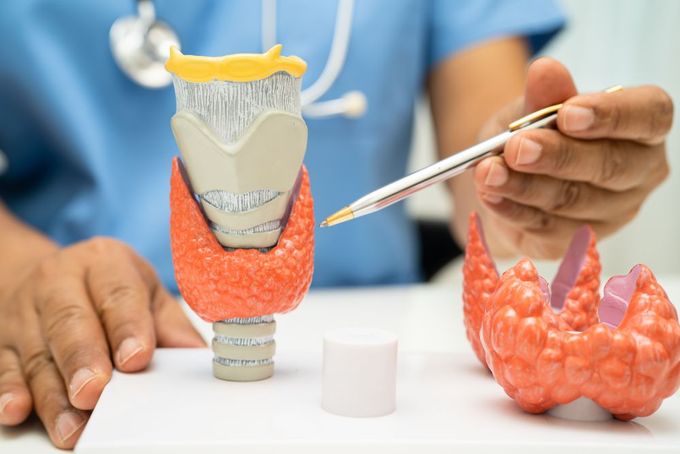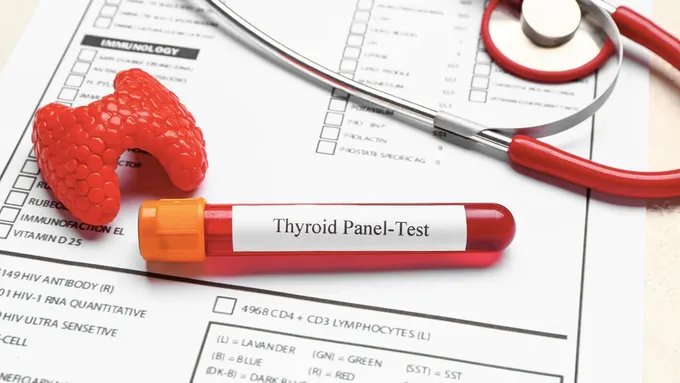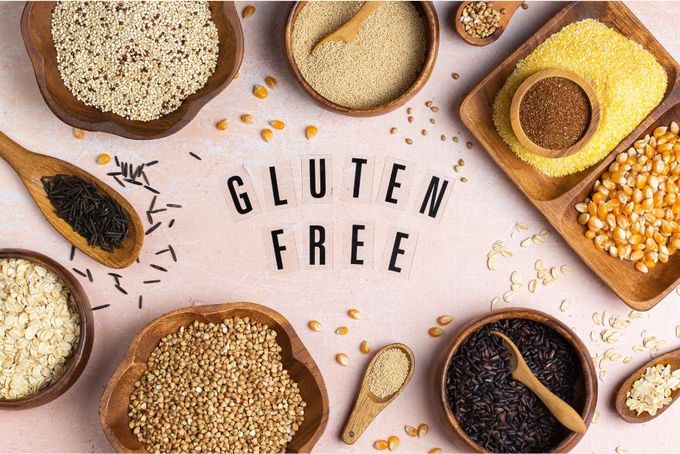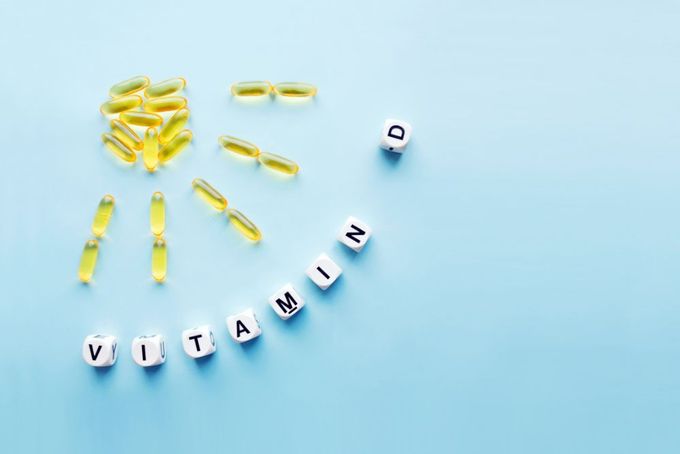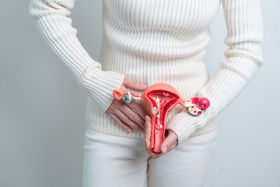What Basal Body Temperature Can Reveal: Undiagnosed Hypothyroidism
Updated May 28, 2025

Disclaimer: Temperature range values indicated in this article for thyroid diagnostic purposes are based on traditional oral BBT values. Tempdrop results run in a different range than oral.
What is the thyroid & what does it do?
Your thyroid is a butterfly shaped gland sitting right in the middle of your neck. Your thyroid gland makes thyroid hormones, which are responsible for regulating the rate and rhythm of all the cells in your body. Think of your thyroid hormones like the ignition switch to each and every cell in your body, playing a pivotal role in metabolic activity including setting and maintaining your body temperature , whilst also involved in digestion, ovulation and detoxification.
What is Hypothyroidism?
Hypothyroidism, also known as an underactive thyroid, is a condition where the thyroid gland doesn't produce enough thyroid hormones. These hormones are essential for regulating metabolism, energy levels, and overall body functions.
What are the symptoms of hypothyroidism?
Hypothyroidism causes the body to run “too cold” or “too slow.” This can lead to:
- Constipation
- Low body temperature
- Inability to lose weight or sudden unexplained weight gain
- High cholesterol on a blood test
- Brittle nails
- Depression and/or lack of motivation
- Fatigue
- Loss of libido
- Intolerance to cold
- Poor concentration
- Irregular periods
- Heavy periods
- Infertility and/or miscarriages
- Hair loss
What is Basal Body Temperature (BBT) - & How Does your Thyroid Regulate It?
Basal body temperature (BBT) is the temperature of your body at rest. This resting temperature is set by the thyroid hormones which regulate the amount of energy (heat) available to your cells. You want just the “right amount” of energy. Too little can lead to hypothyroidism. Typically to get this temperature, you will take your temperature first thing in the morning before you get out of bed and move around.
Our hormones also play a small role in temperature changes within our menstrual cycle. Within the first half of your cycle, ideally you’d like your temperature to be on average around 36.44 Celsius (or 97.6 Fahrenheit), and the second half of you cycle to be on average around 36.88 Celsius (or 98.25 Fahrenheit).
These temperature markers are the values for traditional oral BBT. If you choose to use a smart thermometer such as Tempdrop, your temperatures will be in a different range, but the trend will remain the same (lower before ovulation, and higher after ovulation).
An example of nightly BBT readings on a Tempdrop chart
How to track your BBT
Basal body temperature tracking involves taking your temperature each and every morning before you get out of bed. There are plenty of digital oral thermometers on the market specifically designed to track your BBT. However, there are some issues with these types of thermometers.
The biggest issue is you must have consistent sleep patterns, meaning you must get at least 3 hours of uninterrupted sleep every night to have an accurate reading. This, of course, is no good for women who are shift workers, new mothers attending to their babies in the night, and restless sleepers.
Other issues include:
- You must take your temperature as SOON as you wake up. No moving around first.
- You must take your temperature at the same time each morning.
- Travelling between different time zones changes the time you take your temperature and your sleep pattern.
- You can’t drink alcohol the night before.
- Stress changes body temperature.
- Being sick with a cold or flu or any other type of illness increases immune response and therefore temperature.
- You must sleep in a similar bedroom environment each and every night.
The best way to get around these issues is to invest in a wearable basal body temperature tracker, such as Tempdrop. These high-tech BBT trackers can accurately measure your BBT using a combination of advanced sensors and sophisticated algorithms. As noted above, your BBT range for Tempdrop will likely be different than your traditional oral BBT range.
Tracking your BBT could be the first clue you find your thyroid may be under-functioning
Not only can tracking your BBT be useful for trying to avoid pregnancy (TTA) or trying to conceive (TTC), but this simple measurement can also be used daily to monitor thyroid health. It could even give you the first clue you may have hypothyroidism. As mentioned above, when thyroid function becomes underactive, this causes us to run “too cold.”
Now remember your temperature changes throughout your menstrual cycle. The first half of your cycle (pre-ovulation) ideally, you’d like your temperature to be between 36.1 and 36.4 Celsius (97 and 97.5 Fahrenheit). In the second half of your cycle (post-ovulation) you’d like your temperature to be between 36.4 and 37 (97.5 and 98.6 Fahrenheit).
If your temperature is constantly measuring below this with an oral BBT, it’s a sign you’re not producing enough heat and not producing enough energy for your cells. In a nutshell, you may have a sluggish thyroid.
While Tempdrop cannot be used for diagnosing thyroid conditions, if you notice your temperature averages before and after ovulation are dropping, it may also indicate an underactive thyroid. Also, if you make changes to your lifestyle or medications to treat thyroid disease, you may see your BBT with Tempdropraises on average, indicating your thyroid is working better.
Lab Tests for Measuring Thyroid Health
Whilst feeling cold and having a low BBT cannot diagnose hypothyroidism, it may be a sign it’s time to get your thyroid checked out, especially if you other have signs and symptoms of hypothyroidism.
Many doctors just test for TSH (thyroid stimulating hormone). TSH is such a crude marker of overall thyroid health and tells you nothing about your actual thyroid hormones or your antibodies. You need the full concert of thyroid hormones to completely understand what is happening with your thyroid. You can have a normal TSH level and yet have low levels of thyroid hormones.
The following tests are all key indicators to find a thyroid imbalance:
TSH
- Thyroid stimulating hormone (TSH) is the hormone secreted by the pituitary gland (located in the brain) and is responsible for keeping thyroid hormone levels at optimal levels.
Free T4
- Is the storage form of thyroid hormone and is mostly inactive. Free T4 can be converted to T3 as needed by the body.
Free T3
- Is the active form of thyroid hormone made from the T4 as needed. The amount of T3 being made correlates strongly as to whether a person has hypo or hyper symptoms
Anti-thyroid peroxidase antibodies (anti-TPO)
- Impairs the enzyme making all our thyroid hormones. TPO is the most 'clinically meaningful.' Even in patients who don't have a diagnosed thyroid disease, just the presence can be a forewarning of thyroid disease in 5-10 years. Raised antibodies can indicate Hashimotos.
Thyroglobulin antibodies
- Your thyroid hormones are made from a precursor which is rich in iodine. These antibodies attack these iodine rich precursors, which are stored in thyroid follicles. It represents initial damage to the gland typically preceding autoimmune process, and is not as clinically meaningful in traditional AITD (autoimmune thyroid disease)
Reverse T3
- RT3 is always made whenever you make thyroid hormones. It creates a natural buffer against hyperthyroidism, because it's potentially lethal. The body says hey let's slip a little to the side so we can deactivate it.
Plasma Selenium
- Selenium is one of the most necessary minerals for thyroid health. Selenium is needed to convert T4 into T3 and is particularly beneficial for patients with autoimmune thyroid disease as it reduces inflammation and thyroid antibodies.
Plasma Zinc
- Zinc is another star mineral in thyroid health. Zinc is needed to make TSH and to convert T4 into T3.
Spot Urinary Iodine
- Iodine is the number one nutrient for thyroid health and provides the backbone for all thyroid hormones. A deficiency can cause hypothyroidism.
Vitamin D
- Helps to transport thyroid hormone into cells
Iron
- Assists in the conversion of T4 to T3 and iodide to iodine
If you suspect thyroid problems, ask your doctor to run the tests above. There are also some places where you can order tests yourself, although you may be left to interpret results yourself, as well, which may not be part of your skill set.
Diet & lifestyle strategies for a healthy thyroid
While thyroid disease often needs to be treated by medication, there are a lot of things to do before it gets to a treatable level to decrease your risk of future thyroid disease, as well as to help manage current thyroid disease.
Ditch gluten
- Going gluten free is one the best diet strategies you can implement to improve thyroid health. A gluten free diet has been shown to reduce thyroid antibodies and improve thyroid health in patients with coeliac disease.
Fix intestinal permeability
- When your gut is “leaky,” the barrier between gut and body is compromised. This allows for food proteins that would otherwise hang out in your gut to roam free in your bloodstream. A barrier breach can happen because of infections, hormonal birth control, ongoing chronic gut inflammation, antibiotics, and small intestinal bacterial overgrowth (SIBO). Leaky gut increases your risk of thyroid disease by inhibiting active thyroid production. Remember around 20% of thyroid hormone conversion happens in the gut. If your gut isn’t happy then this can impede thyroid hormone conversion.
Treat any underlying viral infections
- Viral infections have been implicated as a possible cause of Epstein-Barr virus. This common viral infection is more widely known as glandular fever. If you’ve ever had the virus, it will remain dormant within you. If the virus re-activates, it can trigger or worsen a pre-existing thyroid condition. Support your immune system with vitamin A, D, zinc, and add in herbal anti-viral such as Lomatium, Cats Claw, Astragalus, and Nigella.
Get sunlight
- Vitamin D is needed for healthy thyroid production so aim to be exposed to some sunlight during the day.
Foods to include
The following foods will help you to increase necessary nutrients in your body naturally:
- Brazil nuts
- Oysters
- Dulse
- Seaweed
- Cod
- Prawns
- Dark green leafy vegetables
- Animal meats
- Cod liver oil
- Sardines
- Mackerel
Supplements for Thyroid Health
While eating well will help to increase vital nutrients, you may also need to add supplements to your diet to better support your thyroid. Consider the following supplements if you are deficient:
Selenium
- Typical dose ranges from 200mg-400mcg daily
Iron
- Ideal dose is around 25mg daily. Take away from zinc or calcium supplements.
Withania
- Can increase the conversion of T4 to T3. It also helps to reduce inflammation. Dose ranges from 300mg to 3000mg per day.
Iodine
- Iodine deficiency is the number one cause of hypothyroidism. Aim to get between 200mcg-300mcg daily. If you have an autoimmune thyroid condition, speak with your health care provider before supplementing with iodine as it can aggravate your condition. Do not exceed 500mcg unless under the strict supervision of your healthcare professional.
Zinc
- Typical dose ranges from 15mg-40mg daily (take of bedtime away from other mineral in particular iron, as it blocks absorption).
Vitamin D
- If you’re deficient supplementing with 1000-2000IU daily is recommended.
